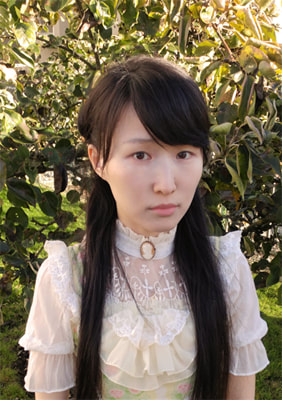In the LakewaterBy Monica Wang
Emily came to town with her mother, a box of clothes, and little else—hardly even a misgiving or expectation. As neighbours began to send over curious looks and spouses across yellow lawns, Emily's mother disappeared behind the dirt-encrusted screen doors of the new house and did not reappear for the rest of the day. Hours later, a pack of children greeted Emily from a distance. A couple of weeks more and Miya decided that they would let Emily play tag with them in the woods.
There was a lake in the woods. Emily looked into the water and then away from her reflection. Miya's stared back instead. Emily waited for the other girl to say something, to tell her about the town or lake or mountains. “You came from somewhere else,” Miya said, her small face unsmiling. Miya was still reminding the others of Emily's outsider status years later, around when Emily's mother stopped getting out of bed.
“It's all the stress of having to raise you,” Emily's mother said in her new voice, low and hoarse. Emily said nothing. She thought of the feral dogs plodding along the borders of town, their thick claws scritch-scratching in silt. Lately she'd been coming across jars and bottles in odd places around the house. In her mind they were connected to her mother's stress, though whether the containers and contents soothed or stoked that stress, Emily didn't know. Or perhaps her mother was luring her into a game, a treasure hunt. One clouded bottle sat in the cupboard, behind the weevil-speckled flour; a half-filled jar that once held jam sometimes materialised in the torn back of the couch. Grown women, as solid and squat as jars, also appeared in the house. Some dropped in for the afternoon while others sat in the living room, where there was only the couch and TV, or in the kitchen, and stayed for days. They were helping out Emily's mom, they said. “You know why they said you should be seen and not heard?” said Miya. The group was digging holes in the woods. Miya stopped and rolled her tool, a pointed rock, in one hand, the pads of her fingers testing its edges. “Old people just say that,” said Emily. “It's a saying.” “It's more than that. It has to do with how spirits can't see us very well, like the way we're too giant to really see insects. They track us by sound.” Miya threw her rock at a dark green beetle. “The spirits, I mean.” “So?” Emily leaned back on her palms and heels and studied the toe prints she left in the loose earth. She wasn't going to keep digging if Miya wasn’t, and she was annoyed about the beetle. It was the colour of these woods. Pretty. Miya was pretty, too, and persuasive. Their friends always went along with her ideas. They can keep digging if they like it so much. “So, it's not just a saying here. 'Til you can fight for yourself, you have to stay small,” Miya said, tilting her head to sneak a glance at Emily, “and move around in silence. Like you're supposed to around something else with good hearing.” Emily tried to see through Miya's long, dark lashes. “Something you see in these mountains...” Miya continued. “Wild dogs?” Emily said. She saw a flash of teeth as Miya jumped up. “Emily called the mountain spirits wild dogs!” Miya looked around at the others. After a pause, they got to their feet. “They're gonna get her!” They ran, leaving Emily alone at the dig site. The hole Miya made was only cross-hatches in the dirt. Emily walked around it and leaned over the deepest hole. Words poured into a hole in the middle of the woods could bubble back up for anyone's ears—she'd read this in a children's book that had been lost during the move. That was why she didn't whisper her secrets into the hole the way she did with the lake. Emily's secrets were poisoning the lake. The edges of the water pulled away from its frame of mud further each day, as if repulsed by her. She struggled, to no avail, to keep back some of her thoughts about her mother to herself.
Miya came for Emily first. “We wanted to see you sooner,” said Miya, “but you probably incurred the spirits' wrath, and we didn't want them to think I was you. We look so similar and everything.” Over Miya's narrow shoulders, Emily saw the others grinning and felt her limbs growing thicker, her shoulders broader. Similar. One of the other girls drew her grin back into a polite smile and asked Emily to join them at the lake. Emily thought of the lakewater, colourless and formless when removed from its home. She stepped back into the house to put two empty jars into a knapsack. When she came out, the group was too distant for their chatter to reach her. Emily ran to catch up. The women in town arranged the funeral for Emily's mother. After the service, Emily gathered her mother's bottles and jars and made several trips to empty them. By then, much of their contents had come from the lake anyway.
Not long after that, what remained of the lake—in the bottles and in the mountains—thickened into disease-coloured sludge. Emily crouched on the edge of this expanse. Saltwater pierced the cracks in the corners of her mouth. She wiped her eyes with a frayed sleeve. I've killed the lake, she thought, trying to dredge up sadness or guilt. Those feelings, too, must have evaporated. In the back of her mind, another thought, something about Miya, was surfacing. It was just yet too small and quiet for Emily to notice. |
|
Monica Wang was born in Taichung, Taiwan, and raised in Vancouver, Canada. Her work has appeared/is forthcoming in Green Hills Literary Lantern, Okey-Panky, and Kansas City Voices.
|

